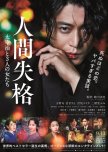Selfish love, addiction, destruction, and literary revolution.
"I want to die. I must die. Living itself is the source of sin. As long as I can make them laugh, it doesn't matter how, I'll be alright."
~No longer Human, Osamu Dazai
I started this film without reading the synopsis but with a wholehearted trust in Oguri Shun, and I was not disappointed.
It's one of those films that doesn't want you to question your moral values, because this simply was a biopic of a blood and flesh human who made life choices that might not be the best, but you have no choice but to accept, "It is real; that's what happened, whether I like it or not." I personally found him exploring self-sabotage and how Japanese society progressed in a very dreamy, unique way. I see some people don't like him, though and I was fascinated to see why.
The storyline revolves around Osamu Dazai, a wife, his two lovers, and the questionable lifestyle choices he made in his 38 years of life. The whole film gives you an eyegasm with its beautiful cinematography of Mount Fuji, cherry blossoms, pretty traditional costumes, and brilliant camera angles.
I don't have anything to say to anyone but the wife, Michiko: "Michiko, I loved you more than anyone" I don't know how much he meant by saying that, but she's the one who sticked to him in thick and thin and showed massive strength to hold this falling "family" together. She's the one whom he needed and she's the one got most neglected. That smile at the end was a sign of relief.
Overall, it's a film about a not-so-great human being trying to create great literature and balance life in the world that he complicated himself. Don't expect it to be a great story that will open your third eye and let you see the world differently, the point is not to glorify but feel this is reality, and that is shitty as hell.
~No longer Human, Osamu Dazai
I started this film without reading the synopsis but with a wholehearted trust in Oguri Shun, and I was not disappointed.
It's one of those films that doesn't want you to question your moral values, because this simply was a biopic of a blood and flesh human who made life choices that might not be the best, but you have no choice but to accept, "It is real; that's what happened, whether I like it or not." I personally found him exploring self-sabotage and how Japanese society progressed in a very dreamy, unique way. I see some people don't like him, though and I was fascinated to see why.
The storyline revolves around Osamu Dazai, a wife, his two lovers, and the questionable lifestyle choices he made in his 38 years of life. The whole film gives you an eyegasm with its beautiful cinematography of Mount Fuji, cherry blossoms, pretty traditional costumes, and brilliant camera angles.
I don't have anything to say to anyone but the wife, Michiko: "Michiko, I loved you more than anyone" I don't know how much he meant by saying that, but she's the one who sticked to him in thick and thin and showed massive strength to hold this falling "family" together. She's the one whom he needed and she's the one got most neglected. That smile at the end was a sign of relief.
Overall, it's a film about a not-so-great human being trying to create great literature and balance life in the world that he complicated himself. Don't expect it to be a great story that will open your third eye and let you see the world differently, the point is not to glorify but feel this is reality, and that is shitty as hell.
Was this review helpful to you?

 49
49 203
203 10
10 4
4 1
1 5
5 1
1 3
3 6
6 1
1 1
1 1
1 1
1 1
1 2
2 1
1 11
11 7
7 1
1























